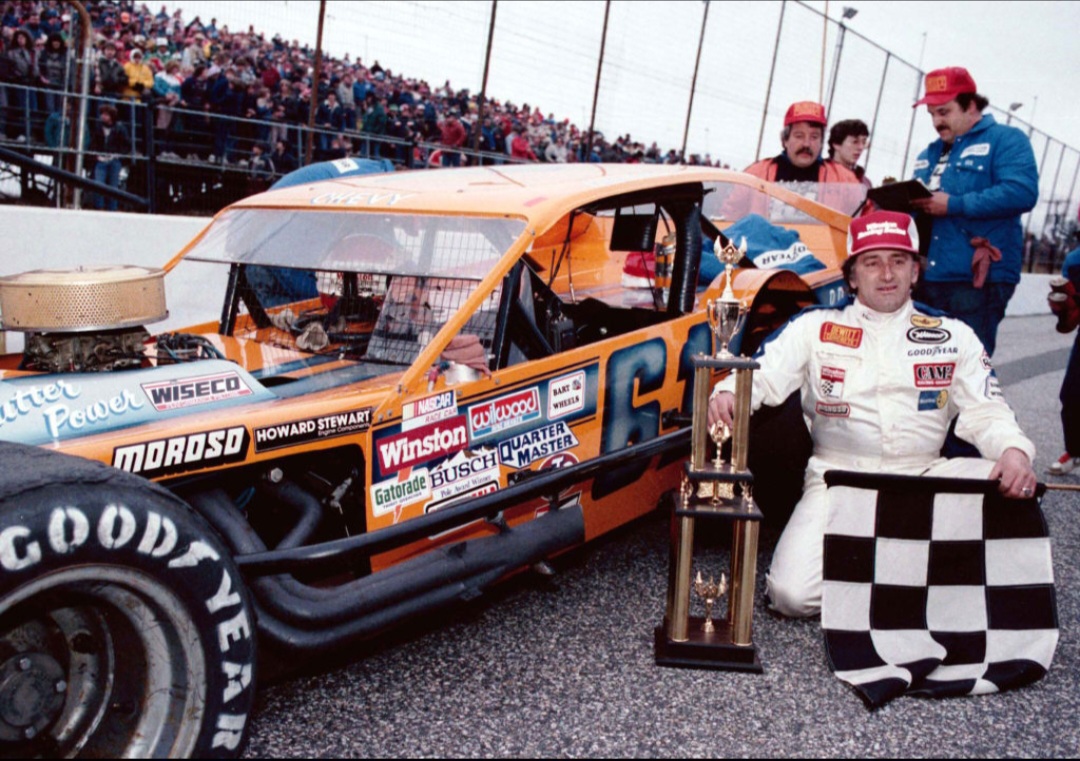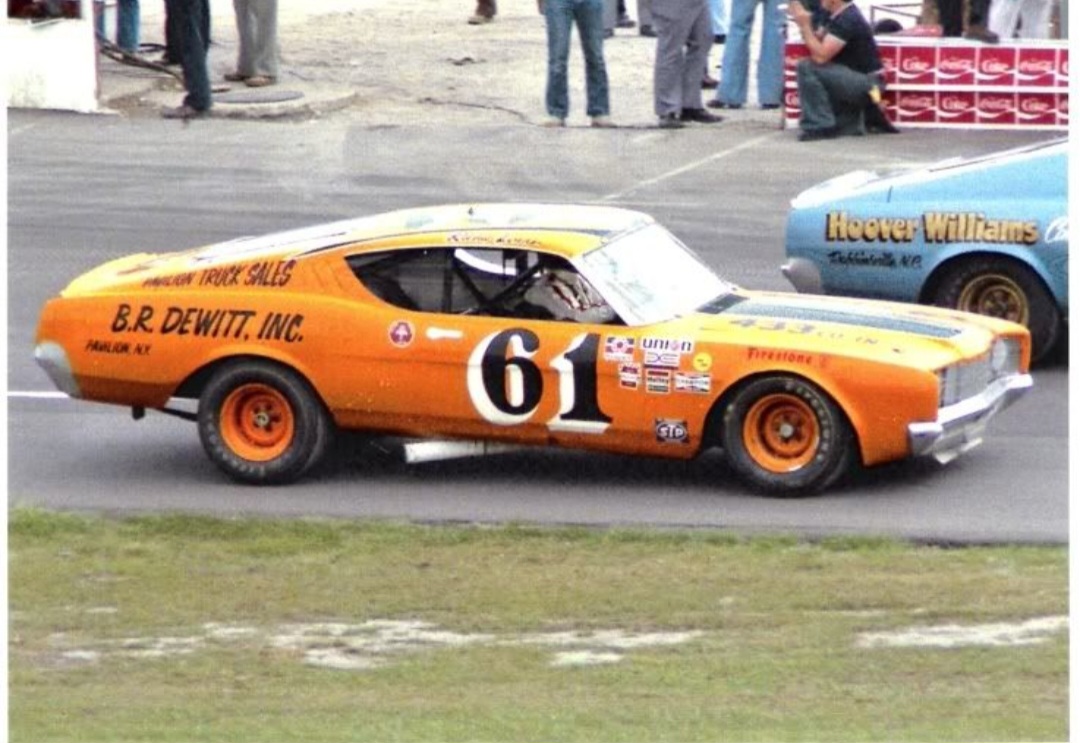“Richie” Evans (July 23, 1941 – October 24, 1985) remains one of the most celebrated names in American short-track racing, especially in the NASCAR Modified ranks. He dominated the sport through grit, mechanical skill, and relentless consistency — earning him the nickname “The Rapid Roman.” —Early Life and Entry into RacingEvans was born in Westernville, New York, and raised on a farm. At age 16, he left the family farm to work as a mechanic at a local garage — a decision that would foreshadow his twin passions for building and driving race cars. His first forays into motorsport were modest. After dabbling in street racing and drag racing, he was encouraged to build a “hobby stock” car to run at the nearby Utica-Rome Speedway in Vernon, New York. He built a 1954 Ford, dubbed PT-109 (a nod to John F. Kennedy’s torpedo boat) and began racing it around 1962. By 1965, Evans moved up into the Modified division, claiming his first feature victory in the season’s final race at Utica-Rome. —Rise in the Modified Ranks & Early SuccessesThrough the late 1960s, Evans built both his reputation and skill set, racing at various regional tracks across New York and beyond. He often competed not only in NASCAR-sanctioned Modified events but also in independent (outlaw) local shows, which sometimes put him at odds with NASCAR’s policies of the era. At one point, NASCAR fined Evans for competing in non-sanctioned events. Evans challenged this by invoking New York’s “Right to Work” statutes. After mounting a legal fight, he won reinstatement and the ability to compete in both NASCAR and independent events. In 1970 and 1971, he claimed track championships at Fulton Speedway, and again in 1974. —National Prominence & Championship ReignEvans’ first national moment in Modified racing came in 1973, when he teamed up with car owner Gene DeWitt and clinched his first NASCAR National Modified Championship. During the mid-1970s, his career intersected with that of fellow Rome, NY, driver Jerry Cook. Cook had won consecutive championships, and Evans often positioned himself as the challenger. From 1974 through 1977, Evans sometimes prioritized big-money individual races rather than chasing full points campaigns, giving Cook the edge in consistency. Evans reclaimed the top spot in 1978, and that year marked the beginning of a historic streak. From 1978 through 1985, he won eight consecutive national Modified championships — a feat unmatched in NASCAR history. In total, Evans won nine NASCAR National Modified Division titles (1973, then 1978–1985). In the inaugural season of what is now known as the Whelen Modified Tour (1985), Evans dominated: 28 starts, 12 wins, 4 poles — and he swept all four events at Thompson, Connecticut. —Performance, Records & Signature RacesEvans was not just consistent — he was often overwhelming. Some of his seasons are legendary by any measure:In 1979, he started some 60 NASCAR Modified events, won 37, and recorded 54 Top-5 finishes. In 1983, he ran 68 events, won 31, and added 57 Top-5 finishes. Beyond points titles, Evans racked up success in marquee events across the Modified circuit. He won the prestigious Race of Champions three times (at Trenton and Pocono). He also scored victories in events like the Dogwood Classic at Martinsville, the Thompson 300, Stafford’s Spring Sizzler, the Islip All-Star 300, and feature wins at Daytona’s Modified events. At regional short tracks, his dominance was widespread: over 30 track championships across 11 tracks in 4 states. Some of the tracks where he won multiple titles include Thompson (CT), Stafford (CT), Utica-Rome (NY), Holland, Fulton, Spencer / Williamson, Shangri-La, Oswego, Chemung, and others. His signature orange #61 machine became legendary. He was frequently voted NASCAR Modified “Most Popular Driver” 9 times. —Tragic End & Posthumous HonorsIn October 1985, Evans arrived at Martinsville Speedway for what would be the season’s final event. He had already clinched the 1985 NASCAR Modified title at Thompson earlier in the year, securing his eighth straight championship and his ninth overall. During practice on October 24, Evans’ #61 car crashed head-on into the concrete barrier on the backstretch between turns 3 and 4. He suffered fatal injuries and was declared dead at age 44. Theories about the crash vary; some suggest a stuck throttle, though conclusive evidence was never established. Despite his tragic death, Evans was awarded the 1985 Modified Tour championship posthumously — the first year under the format that would become the modern tour. In the years following his death, Evans received numerous honors:Inducted into the International Motorsports Hall of Fame (1996) Chosen as one of NASCAR’s 50 Greatest Drivers in 1998 Named to the NASCAR Hall of Fame (inducted 2012) — notably the first inductee whose career was almost entirely in the Modified division rather than the Cup series. Ranked as the #1 all-time Modified driver in the 2003 NASCAR Modified Top 10 poll. His accomplishments—nine national titles, hundreds of wins, and a reputation for both technical aptitude and fierce competitiveness—are still considered among the greatest in motorsports. —Legacy & InfluenceRichie Evans’ legacy in the world of short-track and Modified racing is profound:His record of eight consecutive national championships remains unrivaled in NASCAR. Many drivers today cite Evans as a standard of excellence in mechanical skill, racecraft, and professionalism. Because he built and maintained his own cars, he demonstrated that driving talent and mechanical mastery could go hand in hand — a trait admired in grassroots racing. Numerous memorial events and tribute races have been held in his name, including the Richie Evans Memorial 100 at New Smyrna and local short tracks. His fame helped elevate the status of Modified racing and inspired generations of drivers to pursue excellence on the short-track circuit. irit of American grassroots motorsport: working with his hands, racing week in and week out, and outlasting the competition through consistency, determination, and unrelenting skill.


